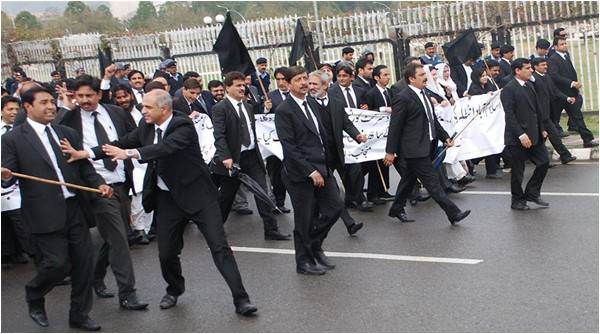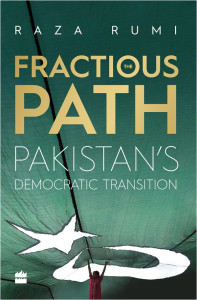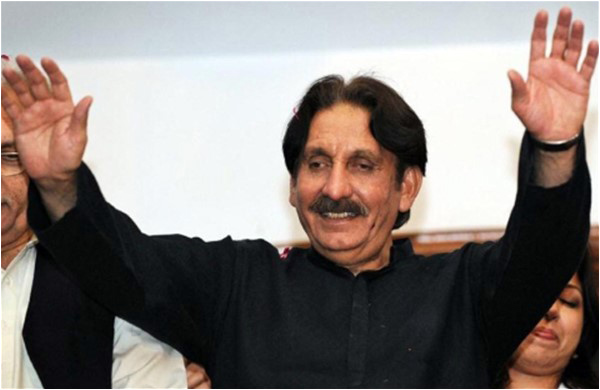
 Fractious Path is a compilation of articles and essays written by Raza Rumi between 2008 and 2013, a period during which democratic rule was fully restored after the assassination of Benazir Bhutto. Peaceful transition of power took place for the first time in the history of Pakistan in 2013 - a unique and unprecedented watershed moment in a country that has precariously vacillated between military dictatorships and democracy of sorts. Needless to say, all that traditional mistrust and the consequent imbalance in civil-military relations have dragged the country back from becoming a progressive, pluralistic, democratic and tolerant society.
Fractious Path is a compilation of articles and essays written by Raza Rumi between 2008 and 2013, a period during which democratic rule was fully restored after the assassination of Benazir Bhutto. Peaceful transition of power took place for the first time in the history of Pakistan in 2013 - a unique and unprecedented watershed moment in a country that has precariously vacillated between military dictatorships and democracy of sorts. Needless to say, all that traditional mistrust and the consequent imbalance in civil-military relations have dragged the country back from becoming a progressive, pluralistic, democratic and tolerant society.The period between 2008 and 2013 is all the more significant for liberals like Raza Rumi because of the romanticism that is associated with the historic developments that occurred in the backdrop of the activism demonstrated by the assertive and ostensibly progressive sections of society. Musharraf and the obscurantist state sponsored mindset had apparently been beaten back, but only momentarily, it later transpired - on account of the popular Lawyers’ Movement which was based upon rule of law and constitutionalism. And despite Benazir Bhutto’s murder in Rawalpindi, the democratic aspirations of the people could not be ‘held in abeyance’, to use a phrase very popular with military dictators of the past when they spoke of the Constitution.
The book consists of carefully chosen essays and articles published during the above-mentioned period which can certainly be described as the most uncertain period in Pakistan’s perpetual existential crisis. Fractious Path is divided into five sections featuring papers on a wide range of issues - especially foreign policy, media and governance.
Raza Rumi's words sound prophetic today when one sees the ballooning influence of unelected institutions
Although in a minority at the time while warning of the Lawyers’ Movement mutating into a right-wing, anti-democracy movement - uttering such words, incidentally, was blasphemy in those days - Rumi’s words sound prophetic today when he is at pains to point towards the ever ballooning influence of unelected institutions, i.e. the military, judiciary and now the media. The assertiveness of these stakeholders has often tended to undermine the elected Parliament. For example, popular expectations were allowed to rise so high that the messianic instincts of the higher judiciary were tolerated and even eulogised by the media even when it took suo moto actions on the price of sugar and the legally correct measurement of a samosa!
So much so that when Iftikhar Chaudhry was reappointed as the Chief Justice he, in vindictive rage, fired hundreds of judges just because they had been appointed by the Zaradri’s PPP. Nobody batted an eyelid when a Supreme Court judge, basking in the glory newly bestowed by the media and brimming with messianic zeal, remarked in his obiter dicta that the judiciary was not answerable to anyone but the people. The same judge (since retired), incidentally, was fond of subjecting senior lawyers like Aitzaz Ahsan and Syed Ali Zafar to hours of long-winded, moralising lectures in open court. One imagines the agony they had to experience may still be fresh in their memories even today.

According to Rumi, one monumental achievement of the 2008-2013 PPP government was the 18th Constitutional Amendment which allowed devolution of power to the provinces according to the true spirit envisioned by the framers of the constitution, which got disfigured almost beyond recognition over nearly four decades. So much so that Article 2A - which was made part of the constitution by General Zia - came to be known in its true spirit as being opposed to federalism, pluralism and equality before the law. But the monster representing the nationalist (read Islamic), patriotic and right-wing sections of the society kept rearing its head in the shape of Memo-gate, the Supreme Court spending hundreds of hours on hearing cases relating to Swiss accounts and the NRO to name but a few. But isn’t Pakistan a coming together of a few nations with their own distinct identities as opposed to being an ethnically and linguistically homogenous nation? An anguished Rumi poses this fairly relevant question in response to a stifling version of nationalism propagated through the media and our school textbooks.
When it comes to media, such half-baked narratives have been in circulation for the best part of last six decades, peddled by the seemingly patriotic and deceptively intrepid newspaper columnist whose legendary shamefacedness means that he religiously cozies up to the ruler of the day - preferably the one in uniform - conveniently forgetting that only a few months earlier he had showered praises on the recently toppled Nawaz Sharif government. Such a columnist, according to Rumi, has no compunction in manufacturing negative public opinion about parliament, democracy and elections.
Rumi lampoons the convoluted narcissism of the typical columnist who feels no embarrassment in quoting parts of his previous columns and publish adulatory letters from readers in his columns. At other times he morphs into the role of a court jester with mirasi and Sikh jokes. The same regressive mindset is on display when the modern-day anchor takes centre stage on our electronic media – barring a few exceptions, of course.
Apart from the fact that articles chosen for the book have a definite nexus with its theme (broadly speaking, the ills afflicting Pakistani society and their causes) the book also offers very insightful and valuable diagnoses. For example, Raza Rumi, being a former civil servant himself, advises how to utilise the large pool of civil servants made redundant at the Centre while, at the same time, being critical of the hurried and unimaginative changes made after the 18th Amendment, which are the hallmarks of a Praetorian society with a strong colonial flavour. It is interesting to note that only one piece of advice offered by Rumi has been heeded: the ‘amorphous’ enemy has finally been identified by our security establishment. The ‘good Taliban, bad Taliban’ narrative has been significantly reduced in public discourse. In fact such a distinction is now frowned upon in some quarters, after the start of Operation Zarb-e-Azb. Apart from that, it is business as usual. The unelected institutions have scant respect for the elected government. In Karachi, after successfully flushing out target killers and criminals, security forces seem determined upon conducting ‘accountability’ and, as a consequence, minus-one, -two and even -three formulas abound in the print and electronic media.
Despite the establishment asserting itself through Imran Khan’s 126 day dharna sit-in in 2014 by reclaiming the precious little lost territory vis-à-vis state policy which it used to jealously guard before the Lawyers’ Movement, Rumi concludes by confidently announcing that the days of military coups are behind us. He calls it a new watershed moment in the country’s history in terms of the continuation of democratic rule. It has to be said that recent events in Turkey may have vindicated his assertion. More importantly, it is hoped that Bonapartism will be discouraged as a consequence in the Islamic world in general and in Pakistan in particular.
Tariq Bashir is a Lahore based lawyer. Follow him on Twitter at @Tariq_Bashir

